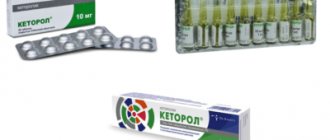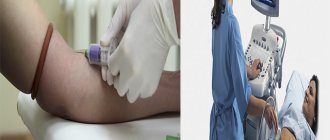Vomiting reactions are considered an unpleasant condition that a woman in an interesting position is forced to deal with. If at the beginning of pregnancy such reactions are completely normal and natural, then vomiting in the second trimester of pregnancy can no longer be perceived as the norm, and therefore requires close attention from specialists and the patient herself. Such a condition may indicate the development of serious pathological processes in the body of a pregnant woman, which can threaten the health of the patient and the safety of the fetus.
Feeling unwell is so exhausting that sometimes you don’t have the strength to get out of bed
Toxicosis during pregnancy
The meaning of the word toxicosis was interpreted by the ancient Greeks as “poisonous.” Science today cannot clearly interpret why not every woman tends to experience it and what determines the intensity of the attacks. There are early and late toxicoses, and if the first one occurs before the 13th week, the late one occurs after 28 weeks, then this does not at all exclude the possibility that nausea with bouts of vomiting cannot persist throughout the entire pregnancy.
Nausea is one of the signs that pregnancy is likely, and if before 13 weeks such a manifestation is more natural, then in the future it is worth carefully monitoring the situation to prevent the loss of the fetus. The likelihood that you will have to go to bed for conservation is high.
Nausea and vomiting, which usually plague a lean stomach, are characteristic signs of toxicosis. In this case, there is a manifestation of intense symptoms at the beginning and a decline from 8 to 13 weeks.
Frequent, severe vomiting, hypotension, and bad breath are signs that the body is unable to cope with the condition on its own. The case requires urgent medical intervention.
Often, nausea during pregnancy goes away spontaneously, after slight adjustments to the diet and the use of alternative medicine.
The use of herbal infusions should be treated with caution, since getting rid of an annoying symptom can aggravate concurrent diseases and lead to exacerbation. Antiemetic drugs for pregnant women can only be prescribed by the attending physician.
It is worth noting that during pregnancy, women are especially careful when taking medications. Tablets for toxicosis in the first trimester are extremely undesirable, as they can harm the developing baby.
Severity
In especially severe cases, contact your doctor immediately
Vomiting syndrome causes a lot of discomfort, accompanied by increased salivation, disturbances in water-electrolyte balance, etc. To select adequate and effective tactics for the treatment of nausea and vomiting reactions during pregnancy in the second trimester, a classification of vomiting by severity is used.
In the first degree, the urge occurs no more than 5 times a day, the patient does not suffer from drowsiness, she is active and cheerful, her blood pressure and pulse are normal. A loss of about 3 kg of weight is quite acceptable.
At grade 2, the frequency of urges increases to 10 times a day, while the patient’s pulse quickens, acetone in the urine increases, and weight may decrease by 5 kg/week. The woman experiences drowsiness and weakness.
In the third degree, in which vomiting is also called indomitable, it develops to approximately 24-25 r/day, which prevents the woman from eating. As a result, patients experience significant weight loss (more than 8 kg), the amount of urine excreted decreases, and acetone is increased in the blood and urine, which leads to frequent hyperthermia. Mommy is worried about her rapid pulse. When severe dehydration develops, the woman becomes drowsy, her blood pressure drops, the patient becomes weak, and her consciousness is confused. This is the most severe degree, in which it is necessary to urgently consult a doctor.
Causes of nausea during pregnancy
Nausea during pregnancy is due to the following reasons:
- Transformation of the body to a new state affects the activity of the hormone progesterone. It tends to relax all muscles without exception, including vascular ones. This effect leads to hypotension, loss of strength, weakness and dizziness. Since the stomach is also a muscular organ, it is also influenced by progesterone and stops working fully - food is digested more slowly and is retained in the digestive system. The sphincter located between the stomach and esophagus relaxes, causing bitterness and acid in the mouth, heartburn. A feeling of discomfort in the intestines is also noted. Deposits of unprocessed food activate the activity of microflora, followed by the production of toxins.
- The mother's body can reject the fetus and perceive it as a foreign body. Typically, immunological incompatibility is detected in the first trimester. The condition requires constant monitoring by doctors and supportive therapy. A woman’s body gradually gets used to the new state and to the new “person” inside itself.
- During pregnancy, the hormone characteristic of this physiological state, hCG, makes itself felt. The maximum concentration of human chorionic gonadotropin is recorded at 9–12 weeks. That is why, from the thirteenth week, a woman ceases to be haunted by nausea and acute reactions to smells and food.
- Excessive anxiety of a woman.
- Diseases of the digestive system.
- Late pregnancy.
- Heredity.
The process of restructuring the body during such a crucial period occurs differently for each woman, and if the nervous system does not cope with the task, the step-by-step process of the occurrence of toxicosis in the early stages of pregnancy is monitored:
- under the influence of predominantly psychological reasons, the center in the brain stem is excited - it regulates emetic processes;
- a nearby center responsible for the respiratory function is included in the process - it stimulates deep breathing during the gag reflex;
- then the center responsible for salivation is connected - intense salivation during vomiting;
- the olfactory zone triggers the mechanism of response to odors.
The process proceeds in a circle and exhausts the pregnant woman. The intensity of the disease depends on the level of progesterone hCG - the higher, the stronger the toxicosis.
The severity of toxicosis: what does it depend on and how is it related to the gender of the child?
The severity largely depends on the presence of chronic diseases and on the lifestyle that the woman followed before pregnancy.
Poor nutrition, obesity, little physical activity and bad habits can also cause poor health.
The birth of a new life is accompanied by a conflict between the body of the growing fetus and the expectant mother. Often the functionality of the organs is reduced because they are unable to simultaneously provide nutrients and oxygen to mother and child.
By the way, you can often hear the opinion that the gender of the baby can be determined by the severity of toxicosis. Thus, severe toxicosis is associated with the gender of the baby: a boy, or, conversely, a girl. Moreover, signs that are directly opposite occur.
For example, severe toxicosis guarantees the birth of a boy, since a woman’s body has to adapt to the other sex. The second opinion says that severe toxicosis is a sure sign of the birth of a girl.
Official medicine considers one of the causes of early toxicosis to be an increase in the concentration of the hormone hCG, which provokes attacks of nausea.
It is known that its content in the blood of a woman pregnant with a girl is significantly higher than that of a woman carrying a boy. It turns out that those who claim that severe toxicosis is a symptom of the birth of a charming female baby are right.
Research conducted in Stockholm denies the connection between the sex of the baby and the condition of the mother. Among pregnant women with severe clinical toxicosis, an equal number of newborns of both sexes was recorded.
Ways to combat nausea in pregnant women
Each case is individual. The most unexpected ways can help pregnant women with nausea:
- it is important to get in the right mood and clearly understand that the process of restructuring the body continues for 9 months and the result is worth being patient;
- if you have a clear understanding of what makes you sick, you can avoid contact with the irritant or postpone the inevitable moment until lunch or dinner;
- You should establish air circulation in the room and walk more;
- since nausea occurs mainly on an empty stomach, care should be taken to ensure that no feeling of hunger appears during the course of the day;
- pills for toxicosis in the early stages may not be needed if, after waking up, you do not jump out of bed, but first eat a cracker or a handful of nuts;
- if a woman suffers from toxicosis, close people can show concern and serve cottage cheese or half a boiled egg in bed;
- meals should be frequent, portions should not be large - it is important that the dishes are not hot;
- The habit of drinking food should be eliminated, but the water balance should be monitored and drink enough water during the day;
- packets of mint, thyme and valerian in tea are an excellent remedy for nausea during pregnancy;
- to get rid of unexpected attacks, it is recommended to have on hand mint tablets that are effective against toxicosis or chewing gum;
- to restore the balance of potassium in the body, the doctor may recommend eating dried fruits, namely dried apricots;
- a piece of ginger root brewed in a liter of water or lemon water is good for eliminating nausea;
- adherents of alternative medicine use acupuncture, aromatherapy, homeopathy, immunocytotherapy, and physiotherapy to combat attacks.
Having chosen an acceptable option to combat nausea, medication for toxicosis during pregnancy may not be needed.
Indications for taking tablets
It is not always possible to cope with the manifestations of toxicosis using improvised means. Intensely manifested symptoms can cause harm to the baby and the psycho-emotional state of the expectant mother.
In difficult cases, the doctor may prescribe medications for toxicosis during pregnancy and admit the woman to a hospital for round-the-clock monitoring of her condition.
Anti-vomiting tablets during pregnancy are prescribed in the following cases:
- if vomiting occurs repeatedly during the day and is not related to food intake, interest in food is lost, the sense of smell and taste changes;
- weakness, depression, depression, apathy, signs of malaise;
- indifference to what is happening, unwillingness to perform daily duties, indifference;
- weight loss of several kg;
- deterioration in the quality of the skin, dryness, pallor, coating on the tongue;
- acetone smell when breathing;
- stable subfebrile temperature up to 37.5 °C.
Even if the above symptoms can be tolerated, it is worth remembering that there is a high probability of hidden pathologies inside the body that can only be detected by laboratory methods. The symptoms cannot be ignored, since we are talking about the safe development of the fetus.
Why are vomiting reactions dangerous?
You should carefully monitor your diet
Frequent vomiting in the second trimester of gestation can threaten the expectant mother with dehydration, therefore, in case of severe vomiting reactions, it is necessary to prevent dehydration. It is absolutely forbidden to drink liquids in one gulp; you need to drink drinks in small sips, but often. If a vomiting reaction occurs immediately after drinking, then you need to reduce the single dose of liquid, but then you will also have to reduce the period of time between drinking.
If the vomiting does not go away and is indomitable, then you need to call an ambulance. A woman in this position with such symptoms is usually admitted to hospital treatment, where therapy is carried out in accordance with the root cause of the pathology. Self-medication in such conditions is extremely dangerous and unacceptable, because in case of vomiting caused by serious poisoning, the mother should receive the most gentle treatment possible so that it does not harm the baby developing inside.
Anti-nausea pills during pregnancy
Tablets for toxicosis during pregnancy cannot be prescribed to yourself. Moreover, you should avoid taking medications in the early stages. The leading specialist develops a treatment regimen taking into account the characteristics of the pathology.
Hofitol
The drug belongs to the drugs that have a positive effect on the function of the digestive system. It can rightfully be considered a homeopathic remedy, since the composition is represented by herbal components. Thanks to the artichoke included in the structure, the effect of gentle removal of bile is achieved and metabolic processes are improved. Tablets for toxicosis "Hofitol" are acceptable for use in the early stages and at the end of pregnancy, with a course of therapy of up to 3 weeks (2 tablets, three times).
Rennie
A popular heartburn remedy available in tablets. "Rennie" consists of calcium carbonate and magnesium carbonate. He is able to neutralize the high acidity of gastric juice. No negative effects on the digestive system have been recorded. With uncontrolled consumption, absorption into the systemic circulation is possible.
Polysorb
"Polysorb" - goes on sale in powder form. A suspension is prepared from it - a dosage form convenient for use. Its action is similar to activated carbon and is essentially an adsorbent. Since the cause of nausea is often accumulated toxins, the use of the drug is logical and justified.
Cerucal
Metoclopramide is an antiemetic for pregnant women, the action of which is aimed at stimulating peristalsis. He is able to stop the penetration of vomiting impulses from the stomach into the brain. Scientific studies have not documented any negative effects of the drug on the body of a pregnant woman. Doctors prescribe Cerucal if there are clinical indications for it.
If the drug is taken in the last trimester, the newborn may be diagnosed with extrapyramidal syndrome. Therapy with the drug in the final stages requires monitoring the development of the baby.
It is worth noting that the drug is prescribed when there is a threat to the life of the mother, mainly from the second month of pregnancy and is avoided a couple of months before childbirth.
Holosas
Rosehip syrup is a natural composition. May be found under the name "Halosas". Does not contain toxic compounds. Gently removes bile and urine, eliminates swelling. The doctor prescribes 1 tsp, three times a day before meals. It is worth noting that Allohol tablets have a similar effect. By choosing a convenient dosage form, you can significantly relieve the load on the liver.
Essentiale
The basis for the preparation of Essentiale capsules is the fruit of beans. The action of the drug is aimed at facilitating liver function. Taking the drug is indicated for establishing metabolic processes and unhindered elimination of toxic compounds. Pregnant women are prone to constipation, and Essentiale capsules improve digestion and make defecation easier.
To obtain the desired effect, capsules are taken with meals (three times a day).
Pyridoxine
Pyridoxine tablets are B vitamins and require careful use, as they can provoke an allergic reaction. The duration of the course of use is determined by the doctor, depending on the severity of toxicosis. It is also worth considering that the tablets stimulate the secretion of hydrochloric acid in the stomach.
If a woman has to travel a lot by transport, it is not necessary to take motion sickness pills for pregnant women. A one-time measure for an annoying symptom can be tea with mint or ginger slices.
How to treat
When vomiting occurs in the middle of pregnancy, women sometimes do not know how to alleviate their condition and how to help themselves. If vomiting starts on an empty stomach, then mommy is advised to eat something, only the food should be light. When going to bed, prepare yourself an apple and a glass of water, some crackers in advance, so that when the morning urge appears, you can immediately prevent a vomiting reaction.
In general, treatment and control of nausea and vomiting conditions in the second trimester of gestation may involve drug intervention, dietary therapy and home relief methods.
Medicines
Doctors usually resort to medicinal treatment of vomiting reactions in pregnant women with vomiting of 2-3 degrees of severity, when the woman noticeably loses weight and suffers from vomiting 10 or more times a day. If vomiting in the second trimester is caused by prolonged toxicosis, then the doctor may prescribe antihistamines and antiemetic tablets; to improve liver function, hepatoprotectors are indicated, and in case of intoxication, enterosorbent agents are recommended.
Among the anti-nausea tablets that are relatively safe for mothers are: Hofitol, Cerucal, etc. Among enterosorbents, it is better to choose Polysorb, activated carbon, and among hepatoprotectors, Essentiale Forte N. Detoxification medications, physiotherapeutic procedures, vitamin complexes, etc. also alleviate the condition.
Diet therapy
Some adjustments in the diet will help mommy cope with vomiting at home. It is necessary to properly organize the pregnant woman’s nutrition, eliminate stressful situations and worries, and create the most favorable and comfortable environment around the woman.
- If vomiting reactions occur after meals, then it is necessary to avoid eating salty, spicy or fatty foods, dishes that have an unpleasant odor that causes nausea.
- In such a situation, flour dishes, as well as those containing a lot of sugar, are also unhelpful.
- Mommy needs to eat 5-6 times a day in small portions; the digestive system should not be overloaded with large portions.
- It is unacceptable to skip meals and leave yourself hungry; such behavior can only complicate the condition.
- When preparing food, the apartment must be ventilated, cooked with the hood on, the window open, etc.
- Immediately after eating, mommy is not recommended to lie down, and clothes should be loose and not tight on the stomach.
- Try to spend more time outside the city, in the fresh forest air, take a walk, preferably every evening.
In general, a pregnant woman’s diet should be varied and nutritious. The basis should be vegetables and lean meat, fruits. If, after adjusting the diet, vomiting does not go away, then specialist intervention is needed.
Home Remedies
Fresh fruit must be included in the menu
Traditional medicine also offers a lot of remedies for the treatment of vomiting during pregnancy. Medicinal decoctions, such as mint, have an excellent effect. You can also prepare a decoction from a herbal mixture that includes yarrow, marigold and mint. 2 dessert spoons of each plant should be steamed with boiling water and left for at least half an hour. Then the mixture is filtered and taken several times a day, drinking in small portions.
Cranberry fruit drinks are very helpful in the fight against vomiting and dehydration. When you feel unbearable nausea creeping up your throat, you need to drink a small amount of this fruit drink in small sips; many pregnant women note that this remedy quickly relieves an attack of malaise, alleviating the condition.
Protein-containing foods such as cheese, eggs or fermented milk products will help avoid vomiting in the morning, and fruits will also help. Evening ailments are more often associated with overwork, so mommy needs to give herself time to rest, taking short breaks.
Contraindications
Not every woman can relieve symptoms with pills. In some cases, taking medications is impossible or for some reason is extremely undesirable. You should not use medications if:
- the doctor does not give permission to use a specific drug;
- laboratory tests indicate contraindications;
- vomiting is constant and it is possible to administer dosage forms only in the form of injections;
- perforation and bleeding in the digestive system were diagnosed;
- taking other drugs is not compatible with antiemetics;
- there is immunity to the components of the drug;
- the benefit is questionable and there is a risk of harm to the embryo.
If toxicosis is mild and it is possible to do without the use of medications, women prefer to make do with home-tested recipes that save them from nausea and vomiting. If you can’t do without pharmaceuticals, you should try safe, refreshing mint tablets that are approved during pregnancy.
Side effects of tablets
Scientists have not come up with a panacea for discomfort during pregnancy. We can say with confidence that there is no remedy for nausea and vomiting during pregnancy that is absolutely safe.
Before using any drug, you must study the instructions, contraindications and side effects in detail, and consult your doctor about the advisability of using the medication.
Even taking into account the naturalness of the ingredients and the absence of chemical, synthetic components, it can provoke:
- loose stools;
- stomach ache;
- dysfunction of the digestive system;
- bitterness in the mouth and heartburn;
- allergies with skin manifestations.
When making your choice among the numerous tablets against toxicosis, you must remember that antiemetics have a fairly aggressive effect on systems and organs. You should strictly adhere to the doctor’s recommendations and observe the dosage. Any changes in your health are a reason to seek help from a doctor.
Why can’t you take medications in the early stages?
This is due to the fact that in the first trimester, absolutely all body systems of the unborn baby are being formed. And any harmful substance that enters the mother’s blood can provoke pathology.
Plus, the chorion is not yet as reliable as the formed placenta; it allows more substances from the outside to pass through it. Also, most medications have side effects, affecting the liver, kidneys, stomach, and these organs are already functioning in difficult conditions.
Of course, this does not mean that one pill taken unknowingly will cause irreparable harm to the child. But many medications increase the risk of harmful effects through the chorion or indirectly on the embryo through a negative effect on the mother’s body.
But there are drugs that are allowed at any time, which do not penetrate the placenta and even the chorion. These are mainly preparations of plant rather than synthetic origin. They should be taken only as prescribed by a doctor.









